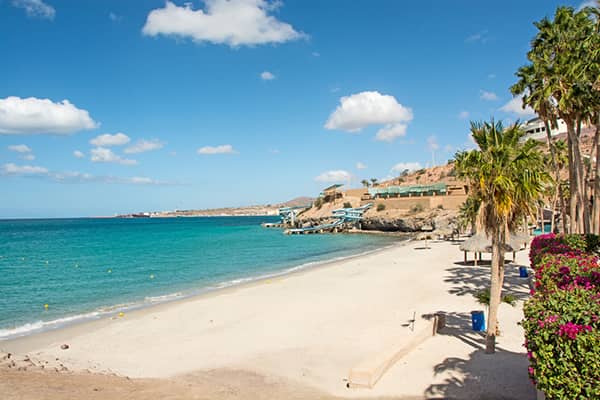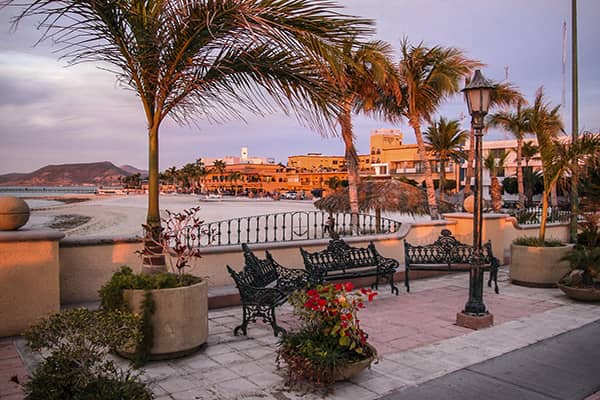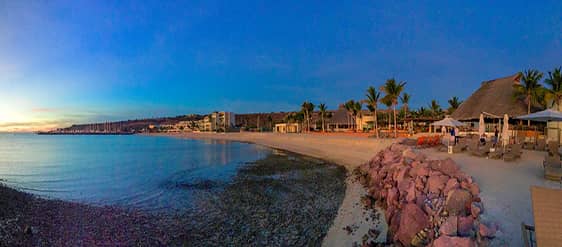An Eco-Friendly Capital
By Melissa Heisler
The Baja California peninsula consists of two states, Baja California to the north and Baja California Sur at the lower end of the peninsula. La Paz is the state capital of Baja California Sur (BCS). Much of the BCS population lives in either La Paz or combined cities of Cabo San Lucas and San Jose known as Los Cabos. The difference between La Paz and Los Cabos is striking. Los Cabos is a tourist destination through and through. If you are looking for an easy transition to a foreign country, check out the English-speaking, English-friendly Los Cabos area. If you are looking to save money and experience the true Mexican culture, look no further than La Paz.
Located on the east coast of the peninsula, the city of La Paz hugs an inlet from the Sea of Cortez and expands in rings to the south. Starting at the water is the famous Malecón which stretches three-and-a-half miles east to west providing a beautiful area to stroll and enjoy the sunshine. Surrounding the Malecón are boardwalk restaurants, artisans selling off carts, hotels, and marinas. This is the most tourist and English-speaking friendly part of La Paz.

Heading south and within walking distance from the malecón is the next ring, old town La Paz. Traditional brick buildings line every street. Across Highway 1, the next section of the city finds La Paz beginning to feel like a modern urban city. Local businesses bump against shopping malls. Here you can go shopping at the U.S. mainstays like Walmart, Sam’s Club, and Home Depot, along with the Mexican superstore, Sorian Híper. The bustle of the city can be felt here. The final ring is one of expansion and breath. Universities, industrial parks, and multiple real estate developments for the growing population fan out from the southern-most part of the city.
Currently the traffic in the last two rings of the city is a bit congested. One of the reasons for this is that the main highway for all of Baja California runs into the city before heading further south. Plans are underway to create a city bypass which should relieve some of this traffic.
Although the capital city and the hub of commerce, do not expect any high rises in La Paz. Much of the heart of La Paz is old-world architecture and therefore only a few floors high. La Paz is more of a sprawling city, known for its breath, not height. Driving from the malecón to the southern end of city checkpoint takes about 30 minutes. The county of La Paz stretches further than that. The La Paz county boasts nearly 8,000 square miles of space making it the fourth-largest municipality in all of Mexico.
Although a very rustic appearing city, La Paz is leading the way in renewable energy. In 2013, an initiative was started to move La Paz to 100% renewable energy. Already in use, the first 39-megawatt solar plant generates 82-gigawatt hours a year, equivalent to 65% of the city’s power consumption.
International air travel is easy due to the La Paz Manuel Márquez de León International Airport. La Paz also hosts a ferry to take passengers, cars, and cargo to and from the mainland.
Lifestyle in La Paz

Unlike Todos Santos, Cabo San Lucas, and San Jose, the other major cities in BCS, La Paz is a city of commerce, not tourism, at least for now. Currently, La Paz is truly a Mexican city. Except in the malecón area, be ready to use your Spanish skills. Although everyone is helpful and friendly, English is not as well known here as it is in other parts of BCS. For some this could be a challenge. For others it is the opportunity to truly experience living in a different culture. Over the next few years, however, we may see the culture of La Paz shift. La Paz has plans to open cruise ship ports increasing its tourism. The city has also authorized private investors to open two new marinas, one with 200 slips, which may change this city of commerce to yet another tourist destination.
Locals and tourists alike view the malecón along the Sea of Cortez inlet as a respite from the bustle of city life. Spanning nearly three-and-a-half miles, the malecón is one of the top tourist destinations and one of the weekend mainstays for locals. Over 60 restaurants are within walking distance from small coffee or fresh juice stands, to authentic Mexican, Chinese, and Italian establishments. Many art galleries and quaint museums also surround the Malecón. Whether you bike, jog, or just like a leisurely stroll, the Malecón is a great place to reinvigorate the soul.
What is surprising about La Paz is that although it is a larger urban city, it is also the launchpad for ecotourism in the region. Just a short boat ride from La Paz is Isla del Espiritu Santo (the island of the holy spirit) a UNESCO World Natural Heritage Site and National Park. Explore the main island by foot to uncover volcanic rock formations, indigenous Pericú archaeological remains, a diverse range of reptiles, birds, and flora, and of course beautiful pristine beaches. Snorkel or dive among the sunken boats and natural reefs that flank the island. Take a relaxing kayak ride to view the island from the water. You can also do some amazing sport fishing in the area. If you want the amazing peace of this natural site, check out some of the Glamping camps available.
Isla del Espiritu Santo is not the only place to convene with nature. La Paz offers opportunities to see gray whales up close, swim with whale sharks, and dive with sea lions. Short drives from the heart of La Paz, one can find nine beautiful beaches on the Sea of Cortez. Balandra, a white sand beach, boasts the famous “El Hongo” rock formation. This beach is a quiet inlet for contemplation and relaxation. Pichilingue is a great place to wakeboard or enjoy chocolate clams. For family fun and a view of Isla del Espiritu Santo, explore El Tecolote. It is the furthest beach from La Paz and a great place for watersports and seafood dining. If you want to hang with the locals, look no further than the first beach from La Paz, El Coromuel. Here you will enjoy the day with other families relaxing under their umbrellas and simply enjoying a day at the beach.
The golf enthusiast can find two beautiful courses both with amazing views of the sea. The Puerta Cortés Golf Club is the only Gary Player Signature course in all of Mexico. This high-end course has its own cigar bar and is located east of the city in the growing tourist corridor. A short 10-minute boat ride from La Paz will bring you to the Paraiso del Mar golf course built within a 1700-acre natural preserve. Enjoy the natural beauty of this area alongside luxury amenities.
Like the rest of the southern peninsula, La Paz does not receive much rain. Because of where it is located, it is also not affected by hurricanes as frequently as other areas in BCS. It does, however, get pretty hot June through September as it does not receive the cooling Pacific breezes other cities do.
Cost of Living in La Paz

If you rent or buy in the tourist corridor, just east of the Malecón toward the numerous beaches, you will find high-end luxury and pricing. If you decide to live with the locals in the second ring of La Paz just off the Malecón and further south, expect to find more affordable rentals.
You will find the overall cost of living in La Paz lower compared to Cabo San Lucas. Both are very affordable by U.S. standards, but if you are looking for a budget place to live and still have access to pristine beaches, check out La Paz.
10 Best Things to Do in La Paz, Mexico
By Noreen Kompanik
Although it’s the capital of the state of Baja California Sur and home to nearly 200,000 people, La Paz, Mexico is slow-paced and relaxed. The colorful city is the gateway to the Sea of Cortez, where the desert melts into the sea, arguably creating the most beautiful body of water in the world.
For many years, it was a jumping-off point for Cabo San Lucas beach resorts two hours south. That is until visitors learned of the vibrant promenade, old-world beauty, magical bays, and protected waters teeming with whales, whale sharks, sea lions, and a host of other sea life.
I first discovered La Paz on a day trip from Los Cabos. I soon realized there’s much more to explore here than I imagined. And you guessed it—I had to come back for more. If you get the chance to visit La Paz, do it.
Here are 10 places to explore and discover in this unforgettable piece of Baja paradise:
1. Stroll the Malecón
Coastal Mexican cities love their waterfront promenade or malecón. And La Paz’s malecón is not only picturesque but also considered the city’s highlight, pulsing with an exciting vibe. Stretching for 3.5 miles, the walkable malecón encompasses beaches, a pier, skiffs, and sailboats resting at anchor, stunning views, and fascinating sculptures by local artists.
One of the most beautiful art pieces here is a statue commemorating the spirit of La Paz, the city that inspired John Steinbeck’s famous novel The Pearl.
2. Kayak at Belandra Bay
Without a doubt, the most picturesque and secretive Baja Peninsula beach has to be Belandra Bay. While only 20 minutes outside the heart of the city, it feels a world away.
Surrounded by massive rock formations, Belandra’s waters are pristine, shallow, warm, and inviting. Known as the Laguna de la Colores (lagoon of the colors), the bay sports six highly-delineated shades of blue and turquoise that dazzle the eyes and make for great photos.
Thatch-roofed palapas (stands) line a spit of sand along the beachline, and the calm waters are perfect for swimming and kayaking. A short but fairly steep hike to the top of a nearby hill provides sweeping vistas of the colorful waters and the surrounding mountains.
3. Swim with Whale Sharks
Jacques Cousteau once called the Sea of Cortez “the aquarium of the world”, and within its protected waters you’ll find whale sharks, the biggest fish in the world. From October to April, visitors can swim alongside these slow-moving, docile plankton eaters. The experience is unforgettable. Whale sharks grow up to 36 feet long and weigh up to 20 tons, but there’s nothing frightening about the gentle giants.
Ecologically-responsible tours also include a visit to the largest sea lion colony in the Sea of Cortez. The fun, friendly, and fascinating creatures playfully interact with divers and snorkelers.
4. Explore Espiritu Santo Island National Park
Just a few miles from La Paz, Espiritu Santo Island is another Baja paradise with volcanic rock formations, white sandy beaches, and crystal-clear waters. This is the perfect place to snorkel through coral reefs teeming with colorful fish and marine life.
Day trips from the La Paz marina are available on vessels ranging from small local pangas to world-class yachts. Along the way to the island on my boat tour, I spotted dolphins, sea turtles, whales, mobula rays, and a variety of seabirds. Espiritu Santo’s preserve was declared a World Heritage Site by UNESCO in 2007. Home to 32 species of reptiles and 98 species of birds, this diverse island and its surrounding waters are a must-visit when in La Paz.
5. Whale Watch in Magdalena Bay
From January through March, the Pacific Ocean and Sea of Cortez are abundant with migrating whales; the whales travel 20,000 miles from the Bering Sea to reach the warm waters of La Paz.
The Baja Peninsula is a premier spot for whale watching. Several companies offer tours that allow riders to get up-close-and-personal with these denizens of the deep.
Gray whales are the most commonly seen, but other whales frequenting the area include blue whales, the largest mammals in the world, humpback whales, and pilot whales. Humpback whales arrive in February and remain through June while pilot whales visit from October through February.
6. Explore La Paz by Horseback
Several local ranches offer guided trail tours that take riders along the ocean, past fishing villages and camps, and through desert canyons.
My horseback adventure with Rancho El Cajon was fantastic. Horses are matched to each rider’s skill level. The free-range animals are well-trained, savvy, and sure-footed, and the three-hour ride was one of the most picturesque, relaxing, and interesting horseback experiences I’ve had.
7. Museum of Anthropology and History
One of the best ways to discover the fascinating history of Baja California is to visit the Museo de Antropologia e Historia. Located in the heart of the city, the museum features well-researched exhibits covering La Paz and Baja Sur’s history. Visitors journey through time from the Paleolithic era to the Spanish missions and colonization, focusing on the impact on La Paz’s original inhabitants.
For history buffs and those who love delving deeper into the local culture, the museum is a treat.
8. La Paz Cathedral
No matter where I travel, I love visiting local churches because they reflect the fascinating architecture, history, and culture of their inhabitants.
Catedral de Nuestra Senora de La Paz (Cathedral of Our Lady of Peace) is a magnificent church located in the city center of La Paz. Originally founded by Jesuit Missionaries in the 18th century, the current cathedral was built in the second half of the 19th century.
The exterior is a sober neoclassical design with a simple facade and two towers. The interior is a different story, with impressive marble floors, stunning stained-glass windows, and beautiful baroque altarpieces from the 18th century.
9. Dine on Mexican Seafood
Fresh fish straight off the boats comes directly to local restaurants. That is how it works in La Paz. One of my favorite places to dine is Mariscos El Cayuco. Located directly across from the marina and renowned for its seafood, the family-owned and -operated eatery has the most tantalizing dishes. Dishes range from ceviche and shrimp to lobster. Their fish tacos are reputedly the best in La Paz (and I would agree).
Add in delicious margaritas, a colorful umbrella-covered patio, and top-notch service by the owner himself, and it is foodie heaven not to be missed.
10. Check Out the Street Art
La Paz is home to vibrantly-colored street art. Over 80 hand-painted murals are scattered throughout the city, created by artists from all over Mexico.
Much of the art can be found in the few blocks surrounding the malecón. The themed murals represent the history and culture of the region. They depict blue whales, ocean conservation efforts, bay fisherman, desert rancheros, and renditions of cave paintings created by the native inhabitants.
Conclusion
Well on its way to becoming the adventure capital of Baja, La Paz is blessed with many natural wonders, including an abundance of sea life.
Add in fresh seafood, delicious Mexican cuisine, history, art, a picturesque and thriving malecón, and cheerful locals, and it has all the ingredients for an ideal and unforgettable vacation.

